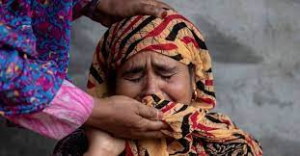
CRISIS OF MENTAL HEALTH FACILITIES IN KASHMIR: AN ANALYSIS OF CHALLENGES AND SOLUTIONS

Abstract
A protracted battle has ravaged the South Asian nation of Kashmir, which has led to a significant shortage of mental health services. Individuals seeking mental health care in Kashmir confront a number of obstacles, including limited access to care, a lack of specialised facilities, the stigma around mental illness, and the psychological effects of conflict.

This academic study examines the difficulties encountered and suggests alternative solutions to deal with the population’s urgent mental health demands while providing an in-depth analysis of the crisis of mental health facilities in Kashmir. This essay intends to emphasise the seriousness of the problem and call for action to enhance mental health care in the area based on the data and research currently available.
Introduction
Kashmir, an area bounded by Gilgit-Baltistan (GB), which is controlled by Pakistan, Azad Jammu and Kashmir (AJK), and India, has been embroiled in a protracted battle for decades. As a result of the conflict’s extensive violence, instability, and trauma, the need for mental health care in the area is critical.
A shortage of mental health facilities has developed in Kashmir as a result of the restricted access to mental health care, a lack of specialised facilities, the stigma attached to mental illness, and the psychological effects of the fighting. In order to address the pressing mental health requirements of the populace, this essay will analyse these issues in great detail and offer some viable answers.
The challenges faced
- Limited Access to Mental Health Services

Kashmir has restricted access to mental health services since there is a severe dearth of mental health experts in the region. The World Health Organisation (WHO) reports that Jammu and Kashmir have a far lower rate of psychiatrists per 100,000 people than the global average of 1.97 psychiatrists per 100,000 people. Accessing timely and effective mental health care is difficult for people due to the chronic scarcity of mental health specialists, particularly in rural and remote areas where the demand is greatest.
- Lack of Specialised services
The majority of the present services for mental health are concentrated in metropolitan regions, hence Kashmir also lacks specialised facilities. This makes it difficult for people to receive specialised care in rural and isolated places, worsening the issue.
Despite the high frequency of such problems brought on by the protracted conflict, according to a report by Médecins Sans Frontières (MSF), Kashmir lacks specialised mental health facilities for trauma-related disorders like post-traumatic stress disorder (PTSD). A further obstacle to providing proper treatment to those with complex mental health needs is the lack of specialised facilities.
- Stigma Associated with Mental Illness
In Kashmir, there is a big problem with the stigma associated with mental illness. Due to societal and cultural standards, mental illness is frequently stigmatised, and those who have mental health concerns typically experience prejudice, ostracization, and isolation.
A study that appeared in the International Journal of Mental Health Systems found that approximately 75% of Kashmiri people with mental illnesses said they experienced stigma and prejudice. Many people are discouraged from seeking support and using mental health services as a result of this stigma, which causes delays in care and ineffective treatment.
- Psychological Impact of Conflict
The protracted fighting in Kashmir has had a negative psychological effect on the populace. The high prevalence of mental health conditions, such as anxiety, depression, and PTSD, is a result of continual exposure to violence, loved one loss, displacement, and trauma.
A study that was published in the Journal of Traumatic Stress indicated that adults from Kashmir had a prevalence of PTSD of 45.7%. Conflict’s psychological toll has surpassed Kashmir’s meagre mental health resources as demand for mental health treatments has risen.
Potential solutions to the problem
A multifaceted strategy is needed to address Kashmir’s dire need for mental health services. First and foremost, it is essential to increase the number of mental health specialists, such as psychiatrists, psychologists, social workers, and other mental health professionals, through recruitment, retention methods, and capacity-building initiatives.
The establishment of specialised mental health institutions, particularly for trauma-related diseases, and their strategic placement in high-demand locations can offer persons with complex mental health needs the care they require.
Additionally, through awareness campaigns, community-based mental health programmes, and interaction with local leaders, efforts should be made to overcome the stigma and discrimination associated with mental illness.
Additionally, improving community-based mental health services through educating and equipping regional health professionals, indigenous healers, and neighbourhood volunteers can aid in reaching out to isolated and rural areas. By educating primary care professionals and creating screening and referral processes, it is possible to integrate mental health services into primary healthcare settings and provide routine and accessible mental health care.
Lastly, encouraging research and data collection activities can lead to the creation of regionally specific mental health programmes and inform evidence-based interventions. Together, these ideas can enhance Kashmir’s mental health services and offer much-needed support to those in the area who are struggling with mental health issues.
Conclusion
The lack of mental health facilities in Kashmir presents serious problems for the population’s mental health. However, there might be ways to deal with this problem that can be put into practice. Steps can be taken to increase access to mental health care in Kashmir by increasing the number of mental health professionals, building specialised facilities, addressing stigma, enhancing community-based services, integrating mental health care into primary healthcare, and encouraging research and data gathering. When implementing these solutions.
It is essential to take into account Kashmir’s distinct cultural and socioeconomic context. Local communities, leaders, and stakeholders should also be included in the planning and implementation process. In addition, proper infrastructure, financing, and resources are necessary to promote the growth and sustainability of mental health services in the area.
The lack of mental health facilities in Kashmir requires comprehensive efforts that include both short-term and long-term interventions. To improve mental health services and guarantee that people in Kashmir have access to timely and appropriate care.
It is necessary for government agencies, healthcare providers, mental health professionals, community organisations, and the international community to work together. In Kashmir, funding mental health care is essential for the region’s general resilience and well-being in addition to being an issue of human rights. It is time to give mental health care in Kashmir top priority and to take a coordinated effort to address the shortage of mental health facilities, promote mental health, and assist those in the area who are struggling with mental health issues.







